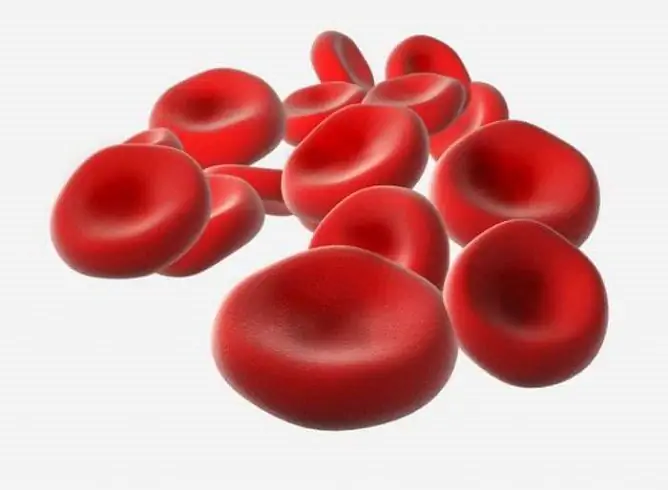- Author Rachel Wainwright wainwright@abchealthonline.com.
- Public 2023-12-15 07:39.
- Last modified 2025-11-02 20:14.
RW blood test
The content of the article:
- What is syphilis
- When is an RW blood test prescribed, what is this study and how to decipher the results?
- How is the analysis done
RW blood test (Wasserman reaction) is a method for diagnosing syphilis. It got its name from the name of the author - the German immunologist August Wassermann. This method of diagnosing syphilis is the fastest and easiest to carry out, therefore it is used as an express test. However, it should be borne in mind that RW has a rather high percentage of false positives, therefore, it requires additional diagnostics, and in many laboratories it is replaced by a microprecipitation reaction (MP).
What is syphilis
Syphilis is a sexually transmitted disease characterized by a high degree of infectiousness, prolonged course, systemic type of inflammation, alternating periods of exacerbation and remission. Syphilis affects various organs and systems of the body, damages the skin and mucous membranes, bones of the skeleton and articular cartilage, the cardiovascular, nervous and digestive systems.

For analysis for syphilis, venous blood is taken
The causative agent of syphilis is pale treponema (Latin Treponema pallidum). The name of the bacterium is associated with its lack of susceptibility to staining with laboratory aniline dyes: when viewed with a light microscope, it turns pale pink and is practically invisible.
Humans have no innate immunity to treponema pallidum. It is able to survive in difficult conditions, exhibits resistance to low temperatures, is well preserved in moist biological materials, and can exist without oxygen. However, outside the body, it quickly dies when heated, dried, treated with disinfectants.
The disease is transmitted through unprotected intercourse with a sick person. Possible infection with syphilis by contact-household, blood transfusion, injection infection, as well as intrauterine - from a sick mother to a child through the placenta. Congenital forms of the disease are especially difficult, they are often accompanied by congenital anomalies in the development of various organs and systems.
In most cases (sexual and, less often, contact and household), infection occurs through open foci of infection. During the incubation period, the disease practically does not manifest itself. After 3-4 weeks, a hard chancre (dense painless erosion or a bright red ulcer) appears at the site of bacterial penetration, which heals after a while.
Despite the apparent well-being, at this time the microorganism moves in the body through the lymphatic vessels, actively multiplies in the lymph nodes and appears in the circulating blood, outwardly manifesting itself already at the stage of secondary syphilis. The patient's general health worsens, the temperature rises, the lymph nodes increase, focal hair loss (alopecia areata) is observed, a spotty, papular or pustular rash (secondary syphilides), syphilitic leukoderma (white spots on the skin), condylomas on the skin and mucous membranes appear on the body the integuments of the genitals. The latent form of the disease is asymptomatic, but the blood test for syphilis is positive.
If the disease is not diagnosed in time, it can last for years. After periods of relative calm, a relapse occurs. Long-term, syphilis leads to irreversible damage to internal organs, central and peripheral nervous system, bone and articular tissue.
There are several methods for diagnosing syphilis. The main part of research involves the isolation of antibodies and DNA of the pathogen in the blood serum. Themselves treponemas can be found in the process of examining a scraping taken at the site of the rash. An analysis of biomaterial (urine, ejaculate, cerebrospinal fluid, mucosal cells, skin) from those organs that may be affected by syphilis is also done.
When is an RW blood test prescribed, what is this study and how to decipher the results?
The Wasserman reaction does not reveal the pale treponema itself, but the signs of its presence - antibodies that are formed in response to infection. The mechanisms of the immune response are activated when antigens - foreign proteins that are part of the cell structures of the pathogen - enter the body. Antigens are specific, that is, characteristic only of a specific microorganism, and nonspecific, found in different organisms.
A large number of compounds with pronounced antigenic properties, which belong to different classes of immunoglobulins, have been identified in the structure of treponema pale. The composition of antibodies also differs depending on the stage of syphilis, the strength of the immune response and the individual characteristics of the organism.
One of the antigenic compounds of treponema pallidum is cardiolipin, a nonspecific antigen that is also present in the bovine heart. During the Wasserman reaction, antibodies to this particular antigen are determined. It works as follows. Bovine heart cardiolipin and a special binding protein - complement are added to the blood sample. If there are antibodies to cardiolipin in the blood, a complement binding reaction will occur, in which the antigen, antibody and complement protein will combine and precipitate. The appearance of such a precipitate means a positive test result. The doctor should decipher the results of such an analysis, guided by the patient's symptoms and data from additional examinations.

The Wasserman reaction detects in the blood not pale treponema, but antibodies to it
With the help of the Wasserman reaction, they regularly conduct examinations of people at risk, which include, among other things, family members of the patient, and everyone who had close contact with him. A blood test for RW is also taken during medical examinations, before planned surgical interventions, if syphilis is suspected. Preventive measures aimed at preventing cases of congenital syphilis include examination of all pregnant women.
Indications for a blood test for syphilis:
- preventive, screening examinations;
- planning pregnancy;
- donor screening;
- preparation for surgery and hospitalization;
- complex diagnostics of sexually transmitted diseases;
- lymphadenitis and lymphangitis, especially in the groin and pelvic region;
- persistent pain in joints and bones;
- the appearance of ulcers on the genitals, profuse discharge from the genital tract;
- rashes on the skin and mucous membranes, resembling syphilis;
- unprotected sex in the absence of confidence in a partner (casual sex).
How is the analysis done
A person who is preparing to conduct the Wasserman reaction needs to know how to take this analysis and how long its result will be valid.
Blood should be donated on an empty stomach, 12 hours before blood sampling, it is advisable not to smoke, drink alcohol, eat or drink, with the exception of water. Typically, laboratories take blood for RW analysis in the morning. Blood is drawn from a vein.
It is generally accepted that the results of a blood test for syphilis are valid for two months.
Sometimes the Wasserman reaction shows a false positive result, so it must be confirmed by additional research.
It is important to differentiate syphilis from other sexually transmitted diseases - HIV, hepatitis, gonorrhea. For differential diagnosis, serological tests are carried out (for example, determination of HCV and HBS - antibodies to hepatitis viruses), virological studies, inoculation of material on culture media.
YouTube video related to the article:

Anna Kozlova Medical journalist About the author
Education: Rostov State Medical University, specialty "General Medicine".
Found a mistake in the text? Select it and press Ctrl + Enter.






